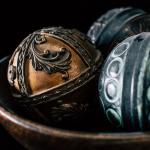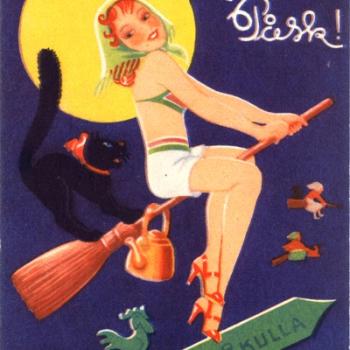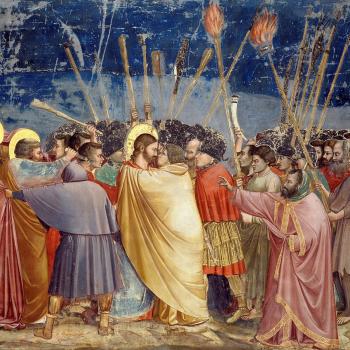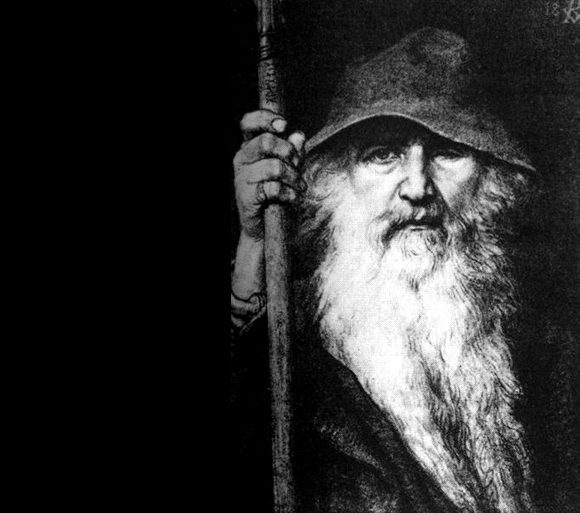
“Lo, I have not been mindful of the sons of men, but the tribe of Cain hath sorely angered me.”
Genesis A & B Book 20. Line 1255
Warlock = from OE wærloga, one who is false to his covenant
The AS Genesis B Text (part of the Caedmon MS) recounts the story of Cain and Abel and attributes earthly sin to Cain for the slaying of his brother. This is a remarkable rendition of the Biblical story in that it colours Anglo-Saxon perceptions and likely has a profound affect upon the Craft, as well as the cultural view of those within it. One such example is the word to denote a male sorcerer of the line of Cain: warlock!
Generally taken to translate as ‘oath breaker’, from wær – covenant, and loga – false. Literally, one who is false to his covenant. However, the terms is used to denote a compact with the devil and wærlogan is used in one passage to denote the people before the flood, perhaps antideluvian giants or Watchers, while another passage clearly uses the term to denote the apostate angels (wérloga) in the AS Genesis. So the term was used in Old English context not specifically to identify any oath-breaker, but was pertinent to the Divil and the Watchers, apostate angels, Luciferian individuals, who had broken the Covenant of Yahweh; or, indeed, preceded the Covenant made with Noah after the Flood.
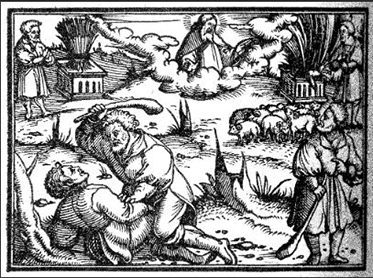
In the Anglo Saxon Genesis, the tribes of Cain are condemned as enemies of the Biblical God, and the offspring that result as a product of the sons of men (tribes of Seth) who took wives from among the Watchers (Tribes of Cain) are called wærlogan. This AS word for the Nephilim often gets translated as faithless spirits, or those who are false to the Covenant – i.e. treaty breakers (a cardinal crime amongst the AS people). The Covenant in question here, especially within this context, is that which is made between Noah and Jehovah. Therefore, the apostate angels and all subsequent sorcerers who are not of Jehovah’s Covenant are wærlogan, Warlocks. Witch, Wiccan, Hell-rūne, heretics are also such believing in that which is contra to the proscribed doctrine of faith that is upheld by the Christian church.
That the AS Genesis B, of the Caedmon MS, recalls the fall of Lucifer and the Kin of Cain as ‘enemies of God’, it is demonstrable through these texts that such a Covenant as exists between Abraham, Moses and Noah with Yahweh never is in place with the angels, Cain or his offspring. The Genesis B work is interesting in that it reflects a very subtle suggestion of Northern traditions (the Devil tempting Eve sharing much with Loki) as well as a hint at Gnosticism. Estimated around 1000 CE, the work tells of two falls. One, of the Angel who opposed God at the start of Genesis, the second of the leader of the host of Angels God subsequently creates. This second is a Demiurgic figure who shares the Throne and shines brighter than the stars with a radiant crown. Furthermore, the AS Genesis B work has two trees within Eden which all men must eat from, the tree of life and that of death. It is the latter which the adversary offers to Eve.
In the AS Genesis, the term that is used that gets translated as Covenant is Treowraeden: “as I teach you, maintain our state of mutual faithfulness.” Gen 2305. Treow (Truth and tree) ræden = condition, stipulation. The word means properly the conditions of our faith, truth, ‘tend the tree’.

There are many speculations upon the internet about the origin of Warlock and its original AS meaning as Covenant Breaker. These are mostly misled and overlook the fact that anybody regarded in the past as performing magick, consorting with devils, or in any way doing something that was against church doctrine was breaking the Covenant with Jehovah; therefore, a Warlock. Many point to the proliferation of this word in Scottish records over English to suggest that it is a word not of Anglo origin. This linguistic error ignores the abundance of Anglo-Saxon words that form the Scots language – to know is to Ken! Indeed, Scots derives in the most part from Anglo-Saxon spoken by Lowland peoples and called, to differentiate from the native Gaelic highland peoples, Ynglis. “Northumbrian Old English had been established in South-Eastern Scotland as far as the River Forth by the 7th Century”.
If, as many state on the internet, Warlock was used widely in Scottish literature, especially quoting Burns (whose language belies predominantly Anglo Saxon Scots), we must look at its meaning. Whilst the word may have been used to denote ‘sorcerer’, more correctly it is being used to identify those whose practice is ungodly, therefore having broken the Covenant of God – Warlock! Any heretical praxis or belief is against the commandments of Jehovah and, by proxy, breaks that oath. In defence of this definition, the truth is that the word has its original attested scholarly translation and it holds.
Where it is interesting is in that it denotes those who oppose the will of Jehovah, those evolutionary spirits who descend from Cain, used in the later literature (especially of Scotland, but also of Old English) to denote those who compact with the Devil – which is a clear breaking of oath with God. Indeed, in a great many witchcraft trials recorded in Scotland, the pact features very strongly. In a number of such cases, the supplicant is first asked to forego their Baptism, which by the very act is a breaking of the church Covenant.
Often, people have quoted Scottish literature and claim that the use of warlock as breaker of Covenant is unattested. 1) Within the Anglo Saxon Genesis manuscript, this word is well attested in the definition of that which breaks the oath or Covenant of God. 2) Later literature and usage in Scotland is consistent with this meaning (not by way of denoting specifically an incantor or sorcerer):
In Scott’s novel, Redgauntlet ( 1824), we have:
“Now this was a tune my gudesire learned frae a warlock, that heard it when they were worshipping Satan at their meetings…”
This is a prime example of the explicit meaning of the word warlock, as attested in the Anglo Saxon texts preserved in the Caedmon MS. Here, the ‘warlock’ is someone who worships Satan, and we are reminded of Genesis B where waerlogan is employed to denote Satan, and his fallen angels, the daughters of Cain and their offspring – all who fraternise with the Devil. No modern example could be more complete of the consistent use of an ancient word.
“I will delate you for a warlock to the privy council!” said Sir John. “I will send you to your master, the devil, with the help of a tar-barrel and a torch!”
The use of the word and its meaning as oath-breaker or liar is no better attested than in Wulfstan’s Homilies.:
“…do not in any way be perjurers or deceivers, violators of agreements or liars…”
Homilies, ed. Bethurum, p. 183
Here, violators of agreements and liars are translated from the Old English wedlogan and wordlogan – one who is false to an agreements, and one who is false to his word. The linguistic evidence, therefore, is clear that wǽr-loga is one who is “false to his Covenant, faithless, a perfidious person”.
This will all be likely refuted and raged against amongst Wiccan and Pagan communities trying to reclaim a word that, as has been demonstrated, was not lost. Rather, what is occurring is a semantic shift whereby the word is adopting a new meaning amongst these modern movements, who are looking to establish tradition to solidify the claims. His is no bad thing.
However, for those of the Old Craft, the word Warlock to denote those ‘Kin of Cain’ is far more pertinent. Indeed, one might refer to a classical Gnostic as being a warlock; those who regarded Jehovah as a false God held no stock in His Covenant. More on this required, perhaps…?




